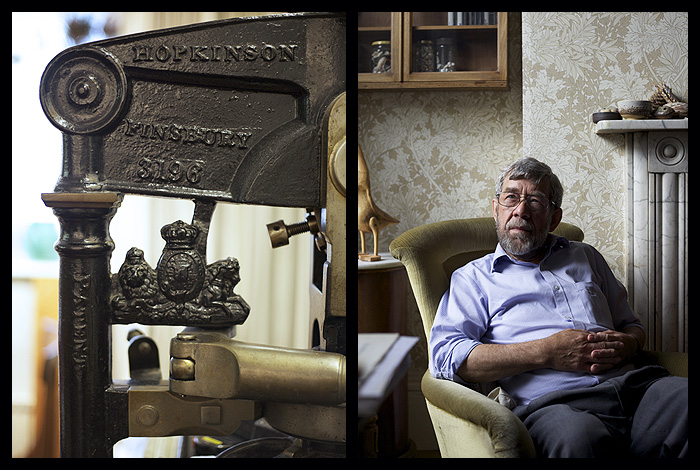
Patrick’s parents were working as missionaries in Africa so in term time he lived with his uncle. His uncle was a headmaster. Patrick’s family had the sensitivity to have him educated at another school, but at weekends he had private printing lessons taught by the art teacher from his uncle’s school. His friend John came along. It was 1951 and they had just turned 13. This early introduction to printing was the seed for a passion that has lasted 6 decades. John went on to study architecture but continued to print, he’s kept all the screen printed covers he designed for his college magazine in the late 50s. As the new recruit at work, he was introduced to an architect who went on to give him his old book binding press. John drove his Morris 1000 up to Dedham to collect it. As he grew more ambitious he started enquiring about a larger press, an Albion. He found one but it was in pieces, his wife forbade him to buy it unless it was refurbished. And this is it, lovingly serviced and delivered, all 3/4 of a tonne of it, by local print engineer and strongman Chris Holiday.
20 Oct 2013
The man said ‘Be lucky’, passed Lisa a dollar and walked away. Tom described the $200 that she made as ‘a nice amount…nothing life changing’. Tom and Lisa had an evening catching up when she was back from Vegas. He told her he’d given notice on his flat, he was moving in with his girlfriend. But they’d split up and now he was heartbroken and tired after a tedious couple of weeks trying to find a new place. Lisa handed him the lucky dollar. Tom kept it folded on his bedside table and eventually ‘life just sorted itself out’. Lisa had a baby, Dylan. Tom asked her if Dylan would perhaps like the dollar now. But Lisa said no, it was his and maybe there was still some luck in it for him.
06 Oct 2013
Paul said they bought it in Brighton. Heather said London. Paul saw a blue shirt with ‘some interesting stuff on it’. Heather saw the greek myths. They both agreed it was expensive. But the money was well spent. In 23 years the shirt has lost just one button and none of its colour. Its quality has been tested, unsurprisingly the shirts near ‘magical powers’ mean Paul’s worn it every week over the last two decades. He says he finds it impossible to feel unhappy wearing it. The only thing that’s tempered how much he’s worn it has been a request from his daughter, Emily. She’s asked him not to show up at parents’ evenings in it, she’s embarrassed to have her dad arrive at school with nude ladies on his shirt. Paul makes a sound argument for the shirt as ‘educational’ – these aren’t any nude ladies, they’re the Sirens from Homer’s Odyssey.
09 Sep 2013
Alex grew up north west of São Paulo in an area patched with sugar plantations and cachaça distilleries. The fish in the local river, the Mogi-Guaçu, give his city it’s name. Each December the fish head upstream to spawn, as they struggle against the current they emit a strange noise. ‘Pirassununga’ means place where the fish snores. This is where Alex began his collection, the city has good weather year round and it’s easy to imagine the sun catching a discarded washer on the ground. Alex would never look for washers, he simply found them on the street. He moved to London and was still attracting washers like a magnet. The collection grew, he threaded them to fill a metre long length of string. The washers have lost some of their lustre recently, instead Alex picks up pebbles spotted by his son Otto. Otto has amassed a sizeable collection on his daily walks to school with his dad.
01 Sep 2013
Three good things. For Keeley, as a kid, tins made her think of tea and cake and old ladies. All old ladies kept tea in caddies like these and all old ladies made cake. The tins belonged to her Nanny Flo, Nanny Rose and Great Aunt Etty. The family had always lived east, Etty lived in Hoxton all her life. It took a bomb to force her sister Violet out, with the added indignity of being re-housed in Chiswick. The blue tin was Etty’s, the red one was her sister Flo’s. The three girls helped in their dad’s Bethnal Green shop, they french polished the cabinets that he made. On the other side of Keeley’s family, her dad’s mum Rose owned the rustiest of the three tins. Rose died young of TB. At 17, her husband Victor had joined the navy, he’d spent two years stationed in Shanghai. Keeley says it could be that Rose picked up the chinoiserie tin at Hoxton market but she’d like to think it was a present that Victor brought back from China.
25 Aug 2013
Summer arrived, marked more by the date than by any noticeble change in the weather. John patiently unstacked the deck chairs in the cold sand. Jane sold ice cream from a kiosk to optimistic holidayers. 20 years later they still spent their summers on the seafront. Their kids, encouraged by nostalgic grandparents, took donkey rides under the pier and back again and again and again. In 2008 a chip shop on the pier was the fuse for a fire that ravaged the structure, after the blaze safety concerns forced the demolition of Weston’s Grand Pier. In 2009 Miranda, John and Jane’s daughter, was close to the limit of her budget for fixing up her house. She’d been given some cabinet doors, saved from a school bonfire by her boyfriend’s mum but Miranda’s kitchen still had no work top. A reclamation yard in Wells was predictably expensive. Miranda asked if they had anything else in the back of the shop. The owner said he thought not…unless she was interested in wood from an old pier.
20 Aug 2013

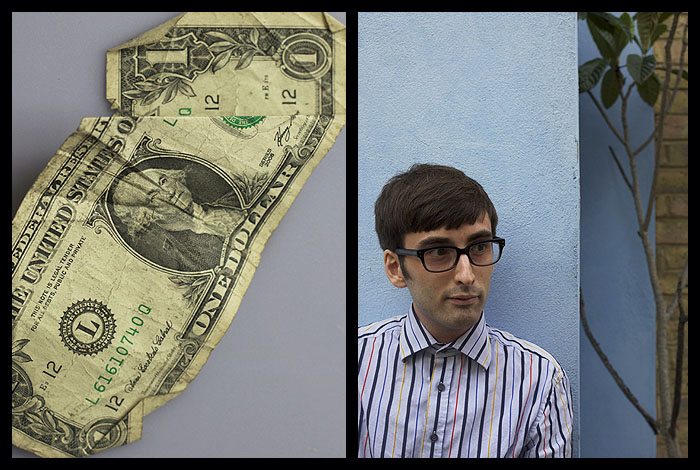
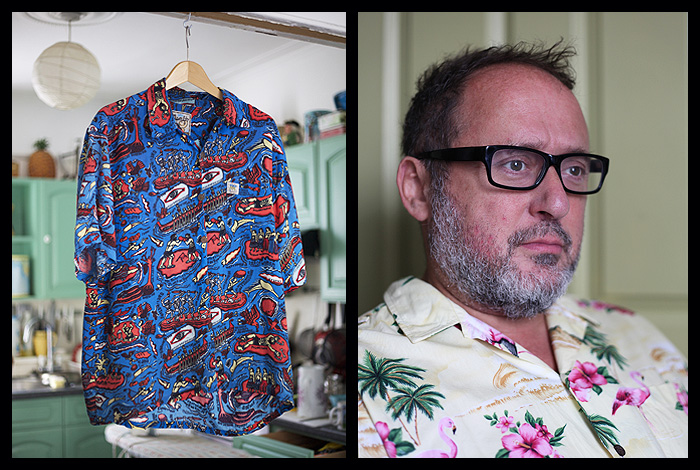
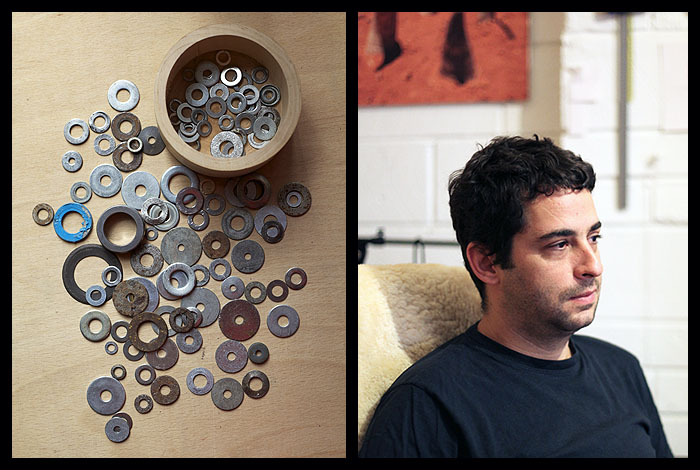
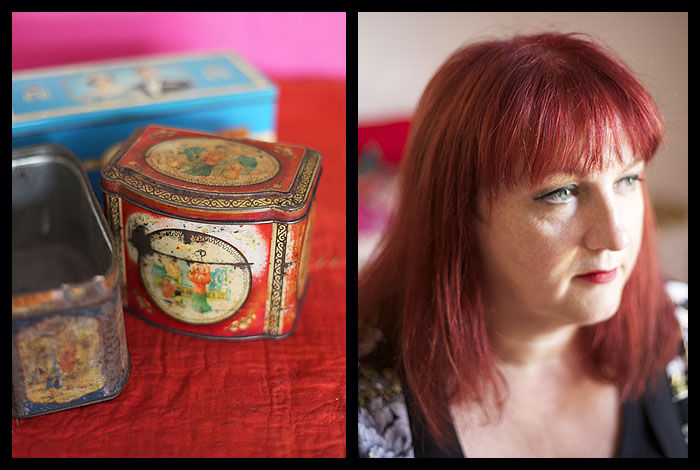
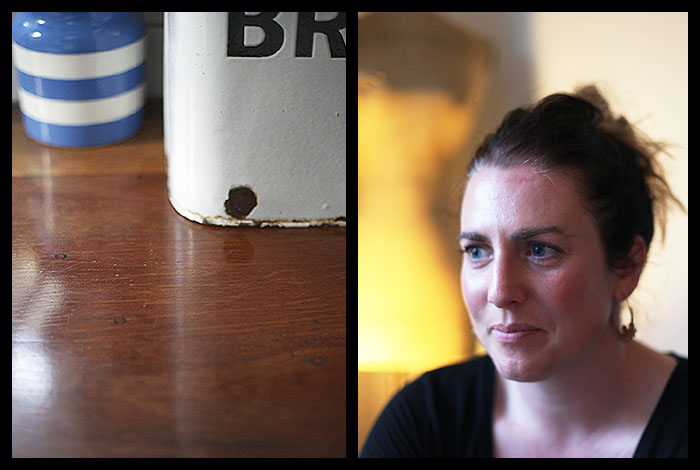
 Subscribe to RSS
Subscribe to RSS Follow us on Twitter
Follow us on Twitter